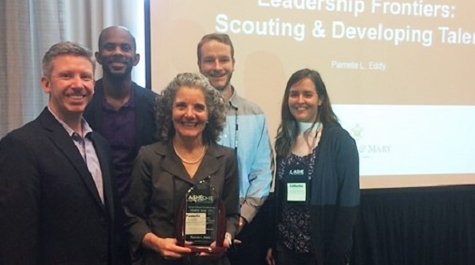Professor wins national lecture award
Pamela Eddy, professor of higher education and chair of the Educational Policy, Planning and Leadership department in the School of Education, was selected as the recipient of the Council for the Advancement of Higher Education Programs (CAHEP)’s Barbara Townsend Lecturer Award last month at the Association for the Study of Higher Education (ASHE) conference. This award is presented to an ASHE faculty member whose book-length publication best reflects their dedication to higher education administration and Townsend’s favorite topics, which included community colleges, feminist studies, doctoral education, and higher education programs.
Eddy won the award for her lecture, “Community College Leadership Frontiers: Scouting & Developing Talent.” As the recipient of this award, she presented a session at the conference, which included 1,600 people in attendance over three days in Houston, Texas. “The lecture provided me a chance to present some new ideas I’m developing in which I argue for the creation of a new approach to leadership development, namely creating a FLEX development program,” she said. “This new approach to developing leaders relies on casting a wider net regarding who is included in development programs to facilitate opening the leadership pipeline, how aspiring leaders can learn about and experiment with ideas about leadership, and how they can explore leadership options.”
The award is named in memory and honor of Barbara Townsend, who passed away in 2009 before assuming the mantle of ASHE presidency. It commemorates her academic and professional achievements as a dedicated former executive director of ASHE, collaborator in the creation of CAHEP, and higher education program chair at four universities. Eddy started her speech with a tribute to Barbara Townsend as a person, colleague, and friend. Townsend was also an alumna of the School of Education’s higher education doctoral program, which she completed in 1983.
“Barbara was one of the first senior scholars I encountered as I entered into faculty work,” said Eddy. “What I recall most vividly about Barbara was her mentoring. As a new faculty member, I faced an issue that I was struggling to address. I reached out to Barbara to ask her advice, which provided a great perspective on some strategies for me to try. It was this type of openness and willingness to support others that is really Barbara’s legacy.”
She continued, “I think it is important to keep the memory of her life’s work alive for others. For example, Barbara edited the first volume on gender issues in community colleges as part of a New Directions for Community Colleges (NDCC) in 1995. I was involved in the second NDCC volume on gender (2008) and most recently edited an update in this series in 2017. This work serves as a way I can help in keeping the important work Barbara started in her career in the forefront for others. I’m profoundly grateful for the chance to have known her.”
